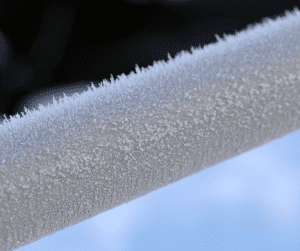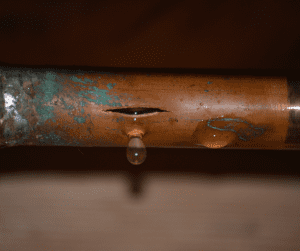Winter brings charming scenes and cosy moments, but it also poses risks to your home’s plumbing. Frozen pipes can lead to major inconveniences, costly repairs, and significant property damage. This guide offers everything you need to know about frozen pipes, from identifying and thawing them to preventing future issues.
 Signs of Frozen Pipes
Signs of Frozen Pipes
- No water flow or reduced water pressure
- Unusual noises from the boiler or pipes
- Visible cracks or damp spots on walls or ceilings
How to Locate Frozen Pipes
Check external pipes first, followed by those in unheated spaces like lofts, basements, and cupboards against external walls. The condensate pipe in modern boilers is often a common culprit.
How to Safely Thaw Frozen Pipes
- Identify the frozen section.
- Apply gentle heat. Use a hot water bottle or a towel soaked in hot water. Avoid boiling water or open flames, which can damage pipes.
- Keep taps open to allow melted water to escape.
Limitations of DIY Thawing
If pipes remain frozen after attempts to thaw them or if you notice any cracks, call a professional plumber immediately. Frozen pipes can cause water pressure to build up, leading to bulging or burst pipes, which in turn cause more damage to your home.
 What to Do if Pipes Burst
What to Do if Pipes Burst
- Turn off the water supply at the main stopcock.
- Switch off the boiler and electricity.
- Drain your water pipes by opening all taps.
- Call a plumber for professional repair.
Steps to Take While Waiting for a Plumber
- Collect leaking water to minimise damage.
- Open cabinet doors to allow warm air to circulate around pipes.
- Avoid using electrical appliances near leaks.
Preventing Frozen Pipes in the Future
- Insulate pipes (lagging): Protects against freezing temperatures.
- Repair leaks: Small leaks can worsen when frozen.
- Keep heating on low: Even when away, maintain a minimum temperature.
- Service your boiler annually: Ensures reliable heating.
- Install a trace heating system: Provides continuous low-level heat to vulnerable pipes.
If Your Home Will Be Vacant
- Turn off the water supply and open your taps to drain the cold water. For combi boilers, this drains the entire system, but hot water cylinders and heating systems need draining separately at their drain points.
- Keep the heating on low or use a smart thermostat.
- Ask someone to check on the property regularly.
Why Are Frozen Pipes a Problem?
When water inside pipes freezes, it expands, increasing pressure within the pipe. This pressure can cause pipes to crack or burst, even before they thaw. Burst pipes can result in extensive water damage, electrical hazards, and costly repairs.
At What Temperature Do Pipes Freeze and Burst?
Pipes typically freeze when temperatures drop to 0°C or below. However, the risk of bursting increases as temperatures stays low for extended periods. External and uninsulated pipes are particularly vulnerable.
Factors That Impact Whether Your Pipes Will Freeze
- External or exposed pipes
- Pipes in unheated areas like lofts or basements
- Extended periods of low heating
Common Myths and Questions
- Do frozen pipes always burst? No, but the risk increases the longer they stay frozen.
- Will pipes thaw on their own? Yes, but it’s risky. Controlled thawing is safer.
- Does leaving the heating on prevent freezing? Yes, maintaining consistent warmth helps.
How We Can Help
If you find your pipes have burst, Metro Plumb can assist. We have depots throughout the UK and we have experienced plumbers available 24/7. Contact the team today on 0808 250 9949 or make an enquiry here.
 Signs of Frozen Pipes
Signs of Frozen Pipes  What to Do if Pipes Burst
What to Do if Pipes Burst